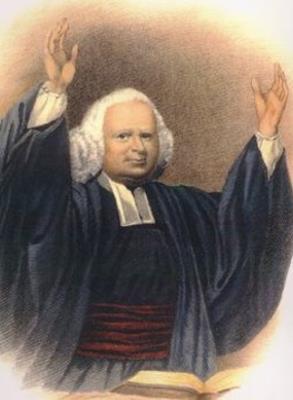The Life and Ministry of Rev. George Whitefield (1714-1770)

Many Historians credit him as being largely responsible for molding a scattered people living in some 13 British colonies into what is known today as, “Americans”. He is often called the Forgotten Founding Father.
He was the spear point of the Great Awakening. A movement that even secular Historians credit as the foundational cause of the American Revolutionary War. He was a powerful preacher that championed the need for a spiritual new birth as declared by Jesus in John Chapter three and was the first true American evangelist. Ejected by many traditional church leaders of his day, he was forced to go out into the fields to preach when church doors were firmly closed to him. Because of this, it has been estimated; 50% to as much as 80% of the colonials heard him and thoroughly knew of him. He was the most famous person in America while he was alive.
Born in 1714 as the son of an inn keeper in Gloucester, England; he managed to attend Oxford as a working student. It was here that he joined the “Holy Club” and was introduced to the Wesley brothers, John and Charles, who later went on to found the Methodist Church. Whitefield eventually was ordained as an Anglican minister. When these two brothers went to America and returned, they pressed on Whitefield how much the Gospel was desperately needed in the colonies.
To officially begin his ministry, he arrived in September 1740 in Boston Harbor. Unlike England; America was suffering under a practice called the Half-way Compromise. Culturally, everyone had to be in church to be considered an upstanding citizen for this was where the colonies raised their taxes. The deal was that unbelievers could have their children baptized in as members. After a few generations, as much as 9 out of 10 members had never experienced the New Birth. As he boldly proclaimed the Gospel, a great split occurred between those who believed in salvation by Grace and those who believed in salvation by works. The former called New Lights were often vilified by the latter who were called Old Lights. Often the Old Lights ostracized and persecuted the New Lights forcing many to flee the traditional churches.
One such group of outcasts met in a log cabin chapel on High Street (in present day Newburyport) and when Whitefield came back through, they asked what kind of church they should have. He said, “Presbyterian to secure your liberties” and Old South has been such ever since. In fact, he established Presbyterian churches across the Eastern Seaboard. The English still call the American Revolution, the ‘Presbyterian Revolution’ as patriots often erupted from these congregations. This denomination’s governmental structure mirrors very closely to a Republic where the pastor is the executive branch and the ‘session’ is like a congress. Firmly believing that a redeemed people led by the Holy Spirit would work toward mutual benefit and not greedy self-interest; he laid the foundation for a people who no longer relied on an earthly king for guidance but on a spiritual one. Hating the fact that the King of England was the head of the church, he firmly believed that government should not have any control over spiritual matters.
Though passing away before the Revolutionary War, his impact was felt as soldiers later fighting the British would give a battle cry, “No king but King Jesus’ Thanks to Rev. George Whitefield, “In God we Trust” is far more important in America than just a slogan on a penny. We’re not subjects to the king, but citizens answerable only to God.
The Spiritual Condition of the Pre-Great Awakening America
The founders explained it as a matter ” of both choice and compulsion.” To understand this we must remember that, while the Puritans rejected the theory that the Church is to be ruled by the State, the)’ went to the opposite extreme of claiming that the State should be evolved from the Church.
Accordingly they divided up the region into parishes, forbade any man building more than half a mile from the meeting house; allowed none but church members to vote; and made all property taxable for the parish. Brave Roger Williams protested, in 1634, that” no one should be bound to worship, or to maintain worship, without his own consent.”
That seems to us just and sensible; but Puritans deemed it treason and heresy, and banished the bold Baptist and his comrades. Those of his way of thinking who remained were cowed into submission.
The inevitable result of such despotism in the name of liberty was formality, hypocrisy and torpidity of religious life. Even of the clergy only a decent morality together with respectable scholarship was required; and a public profession of faith, on the part of church members was dispensed with. It is significant that at about this time the office of ruling elder fell into disuse. It was an era fit for witch trials and scandals. The word went forth from Rev. Increase Mather, the President of Harvard College, that conscientious people would soon “have to gather churches out of churches.” This lamentable declension in piety continued till a reaction set in, of which the revival at Northampton was the sign.
References:
Doctor Horace C. Hovey, Pastor, Old South Church, Taken from Origins and Anals of the “Old South”, pages 22, 23
George Whitefield, Spectacular Conversion, and the Rise of Democratic Personality, by Nancy Ruttenburg, American Literary History, Vol. 5, No. 3, Eighteenth-Century American Cultural Studies (Autumn, 1993), pp. 429-458 (30 pages), Oxford University Press, 1993.
Spiritual Awakenings in North America, Christian History Magazine, Volume VIII, No 3, Issue 23, Christianity Today, Inc., Worcester, PA, 1989.
The Great Awakening in New England, by Edwin Scott Gaudstad, Harper & Row Publishers, Gloucester, MA 1965 (Reprint, Original in 1957)
